#the complete lack of historical perspective sure is something
Explore tagged Tumblr posts
Text
*points* hey, the Nazis did that one!
In a move that has raised serious concerns about Israel’s long-term intentions for Gaza, the Israeli military has announced the creation of a new position: the “Chief Gaza Officer.” The role, far from being a temporary wartime measure, is designed to oversee “food, fuel and everyday life infrastructure” in the Gaza Strip for “years and years to come”, according to a senior military source speaking to YNET News. The appointment of a Brigadier General is seen as the establishment of a de facto permanent governor for Gaza, a development that has sparked fears that Israel is planning to reoccupy the coastal enclave indefinitely, potentially completing the ethnic cleansing campaign that began during the Nakba of 1948, when 750,000 Palestinians – three quarters of Mandate Palestine’s population – were expelled from their villages.
Continue Reading.
#is it time for Operation Anthropoid 2???#the complete lack of historical perspective sure is something
5K notes
·
View notes
Text
grips your shoulders really tight. we all understand that Germa 66 embraces Fascist gender roles right. We all get that yeah? And it's important because it was one of the earliest things established about Germa & its royal family?
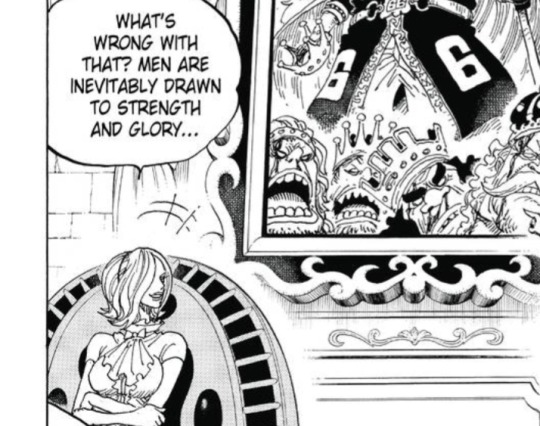
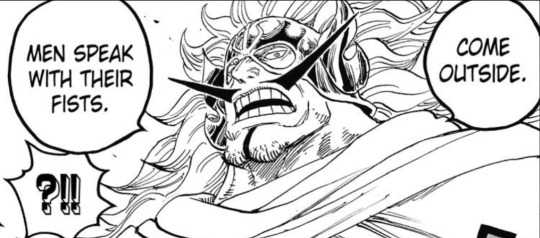
And yes, the issue with Sanji's chivalry is that some acts of chivalry are historically rooted in the assumption of male superiority.
But One Piece goes out of its way to show that Sanji isn't refusing to fight women because he thinks he has an unfair advantage. He respects the power of his female crewmates and allies.
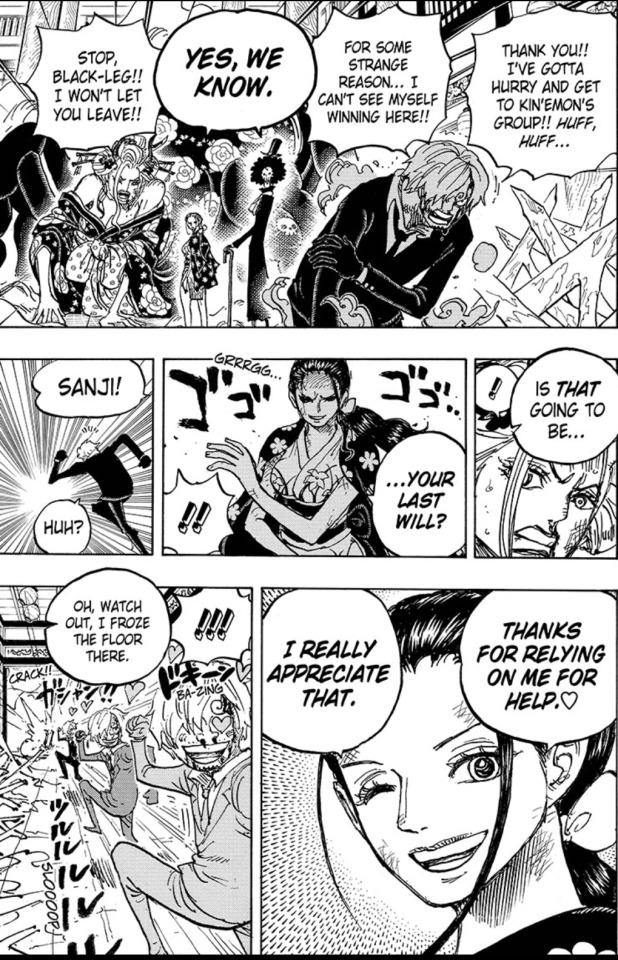
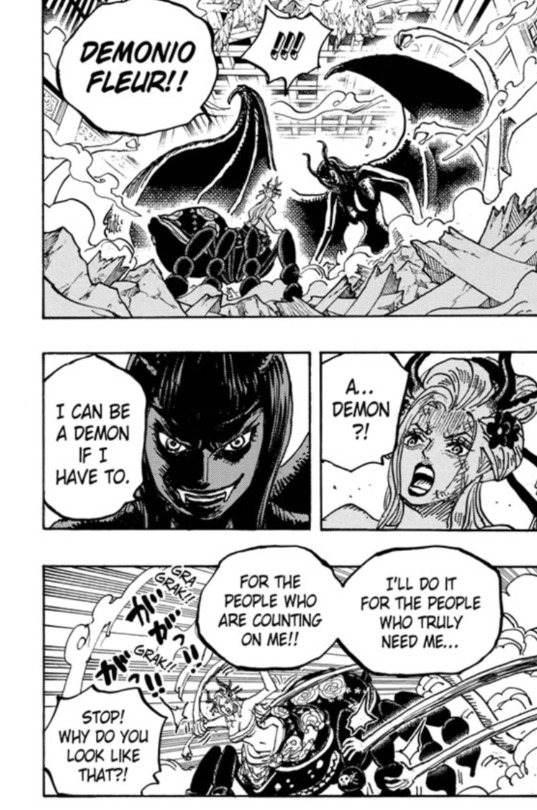
Which seems nonsensical until we learn that Sanji's attachment to chivalry, and particularly refusing to hit women, is rooted in his love for Zeff.
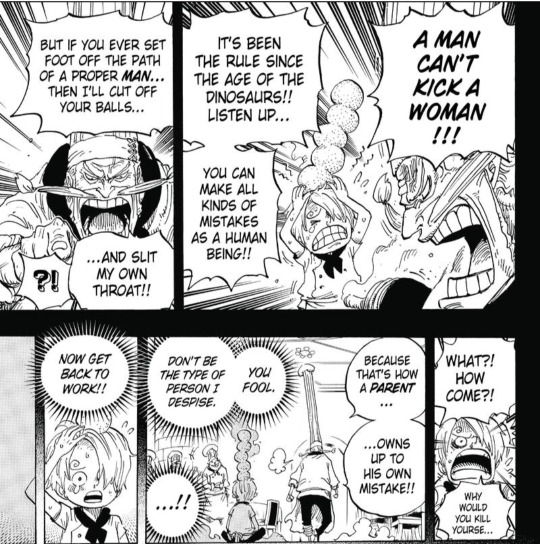
To Sanji, refusing to hit women isn't a reinforcement of male superiority. It's a symbol of his bond with Zeff-- of Zeff's willingness to take responsibility for Sanji where Judge chose to neglect and abuse him for things beyond Sanji's control.
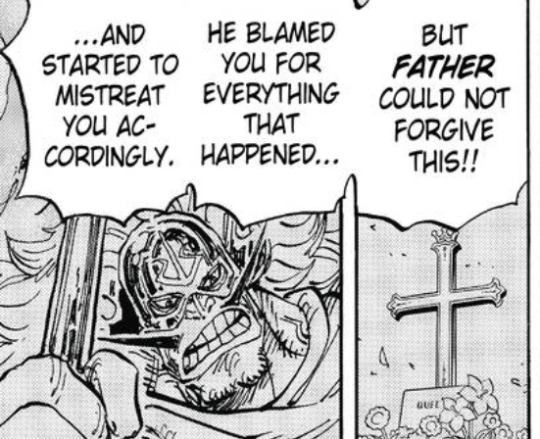
From a Doylist perspective, this can sound a little contrived on paper. But it makes perfect emotional sense to me. I've gone into a lot of detail here, but fundamentally Sanji is just unquestioningly emotionally attached to an outdated cultural ritual because of something his adoptive dad said that meant a lot to him. That's really not so complicated!
NOW. BACK TO THE FASCISM.
What we DON'T see as directly stated as "men speak with their fists," is the complimentary implication that Germa 66 also enforces fascist gender norms upon women, to some extent.
Sure, Reiju has a raid suit like her brothers and apparently goes into battle with them. But the subservient gender dynamic is still present in Reiju's genetically engineered inability to disobey her Father's orders.
Her designated number being 0 also signals inferiority to her brothers. Despite being firstborn and having many of the same supernatural abilities as her brothers, she is not a male heir and therefore doesn't count.

Sanji's mother's near-complete lack of control over her children being genetically altered, as well as her lack of control over how they were raised, further implies a STEEP and distinctly fascist-adherent gender inequality in Germa 66.
All this to say, Sanji's resulting crossed wires and strong opinions about gender are hilarious when you really understand them.
He feels strongly about placing women on a pedestal because the people who abused him considered women lesser beings, because the women in his early life did not abuse him, and because his adoptive dad said something meaningful to him right after reguegitating some unquestioned gender role stuff.
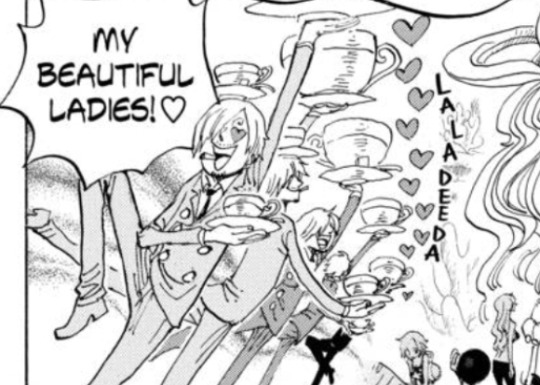
He feels strongly about being gruff and combative towards men because he was emasculated by his male abusers for being unable to fight, and because he was adopted by a ruffian chef who put on a gruff, combative front while communicating love through acts of service.
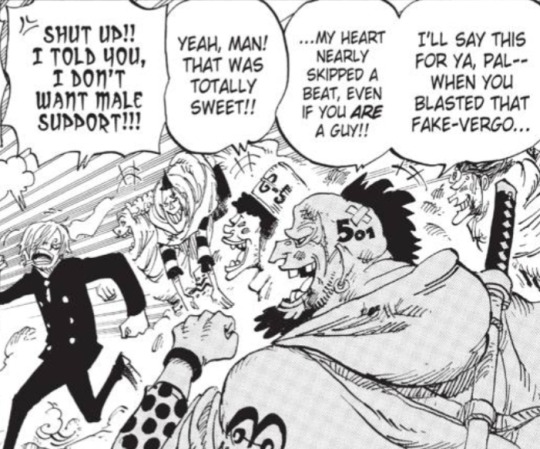
Maybe the superficial harshness was familiar enough for Zeff's kindness to feel more believable. Maybe putting on the same harsh act made it less nerve-wracking for Sanji to do the kind things he spent so long being punished for.
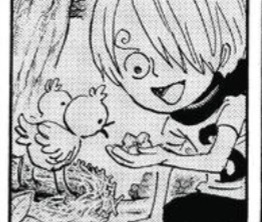
I don't remember where I originally planned to go with this post. I like Sanji. His relationship to gender is a fucking hilarious mess, which I can relate to. Hi Sanji. Throws him into the ocean
270 notes
·
View notes
Text

WBK: 4
Spectre: The Unseen Horror
Spectres are ethereal, ghost-like beings often described as manifestations of lingering souls or unresolved trauma. Typically tied to the dead, they hover between worlds, and their appearance often coincides with dark, unsettling environments—cemeteries, battlefields, or abandoned places. Unlike more corporeal spirits, Spectres lack a physical form, which makes them both more elusive and terrifying, as they often seem to materialize from nowhere, haunting with an icy presence or a bone-chilling whisper.
Historically, the term “spectre” has been used as a synonym for ghost, but it carries a darker, more sinister connotation. A Spectre is not just a restless spirit—it is often associated with revenge, sorrow, or a warning, appearing to those who are destined to face their demise. In some folklore, Spectres are seen as omens of death, making their haunting all the more frightening.
——————————————————————————
One of the most recognizable uses of the term “Spectre” in pop culture is in the James Bond franchise, where “SPECTRE” (Special Executive for Counter-intelligence, Terrorism, Revenge, and Extortion) is a nefarious organization. Though unrelated to ghostly phenomena, this use of the term evokes similar feelings of dread, secrecy, and danger. In a sense, the criminal organization operates like an unseen force, striking fear into its enemies and remaining shrouded in mystery, much like the spectral entities in folklore.
A more literal use can be seen in horror media such as Crimson Peak (2015), where the ghostly apparitions behave in a very spectre-like manner—shadows of the past that linger due to tragedy and vengeance. The ghostly presence in the film is not just a scary visual, but a manifestation of trauma and guilt, reminiscent of the folklore surrounding Spectres.
——————————————————————————
So, could the concept of Spectres be based on something real? Some suggest that what we perceive as ghosts, spectres, or other paranormal beings might be a result of psychological phenomena. Sleep paralysis, for instance, has been frequently linked to ghost sightings, where the brain awakens before the body, leading to visions of shadowy figures and otherworldly entities.
Another possibility is that Spectres could be connected to the natural human fear of the unknown and the dark. Our brains are wired to perceive threats, especially in poorly lit environments where shapes and shadows can easily be misconstrued as something more sinister. In this sense, Spectres might be our own psychological projections, born out of fear, grief, or trauma.
That said, there are still countless stories from all corners of the world that speak of real encounters with these beings. In some cultures, their existence is an accepted truth, a part of everyday life that’s not questioned. So tk be honest i’m not completely sure what to believe. I guess it depends on different perspectives and beliefs.
5 notes
·
View notes
Text
thoughts on Orwell's 1984 because it took me 2.5 months but i actually got all the way through it!
oh my gosh this book is going to live in my head for an eternity
Orwell is a fantastic writer, and I really enjoyed his style. It's all very intense, and the vibe is a constant intensity. There are very few moments without a sense of being watched, without a feeling that doom lurks just on the horizon, and when, in the rare moments where that feeling of paranoia fades and peace begins to set in, he subverts it, and that's the moment something leaps out of the shadows. It's masterfully crafted and really well done.
This book is extremely obviously about socialism, and the dangers of moral relativism and historical revisionism. Sure, you can throw in other messages too, about like cult worship, secret societies, whatever. But Orwell put this world together as a criticism of the ideas of socialism and socialist ideology. He's clearly an anti-socialist, which makes complete sense, based on his background, life, and his other works, what we know about him, and even this story.
1984 follows this guy, who literally is just some guy, as he figures out he has a brain and he doesn't want to scream in hatred when he's told to.
Okay, speaking of, the amount of parallels that can be drawn from this book to society is disturbing. Like even if we go off of the idea of the "Two Minutes Hate", which is the daily time in which everyone is organized to basically yell at the person society has chosen to hate, that day, one can easily draw parallels between that and say all of social media electing to hate on this person today, that person tomorrow, ruin their life, and then move on. It's disturbing.
Also, a lot of Orwell's thesis statement in this book is on the idea of language and how it's connected to thought. He has this idea that one can only truly think a thought if one has the words to describe that thought, and if one cannot name the feelings, one cannot really be having the feelings. It's a horrifying concept, but one that basically every person needs to keep in mind. The vocabulary you possess controls how and what you think. What you cannot name, you cannot know, you cannot see, you cannot truly understand.
So like, one thing this book really tries to tell you is to pay attention to the words you use. Why do you use them? How do you use them? Where did you learn them? What are their origins? Etc etc, because, really, whoever controls the language controls the minds of the people who uses it.
I thought the romance was horribly unromantic, and it really drove the point home about the mental state of both Winston(just some guy) and Julia. Their being in a relationship is in and of itself an act of rebellion against those who want to abolish everything.
The whole point of this book really really comes back to, over and over, this idea of power. Who has it, who should have it, how it works, why people want it, blah blah blah. It's done spectacularly. You reach the last page and you sit there like "Dang. What did I just read."
Big Brother, also, is a super interesting concept that's used in the book, and I must say the idea that eyes are always watching you and might be listening to you reminds me of all those "Hello FBI guy who lives in my laptop computer and watches my search histories" memes. But in a trippier way. Anyways. Just a thought.
The total lack of privacy is so prominent in the book. Every private moment sticks out like a breath of fresh air.
If you're going to read this book, like, one thing to remember is that a) nothing is what it seems, and also b) the Party REALLY KNOWS WHAT IT'S DOING. Never think that they just say things. Never think that they don't know what's going on. Never think for even one moment that they don't know what they're doing. Because if you think that, you're making the same mistake as the main character.
The last chunk of the book is really hard to read, honestly, from a reading perspective, just because it's so psychologically intense. It's this sort of conversion process, trying to turn our beloved Winston(just some guy) into the perfect party member before they kill him. The whole torture, interrogation, conversion process is deeply grimy. It feels like walking down a tunnel but knowing there isn't light at the end. But you hang onto your hope. It's all you've got at this point.
You know that there's no way to make it out of this situation. But you keep reading in hope.
Also, the main bad guy starts monologuing. Reveals his whole evil plan. Which makes you grossed out in your own mind and makes you want to throw the book out the airplane window. It's masterfully written, and Winston is so interesting to watch, because he's the perfect person to empathize with. You wonder how long you could hold up. You wonder how long it would take you to crumble. And really, inside, you know you're crumbling with Winston. You go through the horrors of his imprisonment, and you reach the end of the book.
You can tell it's the end. If you're paying attention, you'll catch how they ruin him all the way. You'll see the moment that lets you know he's done. He's exactly where they want him.
He's renounced his beliefs, fallen in line perfectly. He's done exactly what they want. And now, now they could do exactly what they want with him.
He doesn't die. I'm going to tell you that much.
But the end of the book makes you wonder how much you are Winston. How much of your life is spent doing what every party member does. How long you've got before the interrogation starts. How long before they treat you like a heretic who needs to renounce their heresy, spit upon it, curse it, all the way while they walk to their stake.
The end of the book is sad. It is hopeless. But it is very, very real. The realest thing in this book is its ending.
The last line clenches your stomach like nothing else in the entire novel.
#1984#that was a REALLY fun read#a dark and depressing and sad read#but oh stars was it a fun trip#1984 orwell#1984 george orwell#george orwell#orwell 1984#1984 book#river reads books
327 notes
·
View notes
Text
Cultural Appropriation and Witchcraft
I'm sure this is a common phrase many people have seen before in witchcraft and pagan spaces alike - as well as in broader society. This is by no means a new topic in these circles or others. But, most of the posts on it in regards to witchcraft specifically that I have seen talk about what is culturally appropriative, and not how to assess the difference between appropriation and respectful, appreciative learning (when appropriate to do so, of course). Additionally, I have seen few posts discussing how to deconstruct your own practice to determine if something you have already absorbed into your practice is culturally appropriative, and if so how to remove it. So, that is what this post will focus on.
Note: These are based on my experiences and a multitude of critical discussions I've had with fellow witches in person and online. My voice and viewpoint is by no means the only one, and this post is not a complete snapshot of this complicated topic. This is intended to spark thoughtful analysis of our practices, and provide a few starting points for diving deeper into the topic independently. Any additions to this post from others who have thoughts on the topic are greatly welcomed, as this is an ongoing discussion that involves us all!
What is Cultural Appropriation?
In case this is the first time someone reading this has come across the term, cultural appropriation is defined officially as "the unacknowledged or inappropriate adoption of the customs, practices, ideas, etc. of one people or society by members of another and typically more dominant people or society" (Oxford Languages). In simpler terms, it's when one group with more social power adopts things from a group with less social power in a way that is inaccurate to the source, or that doesn't acknowledge the source at all.
Some common signs of cultural appropriation to look out for:
A lack of respect towards what is adopted, or the source culture
A lack of knowledge about what is adopted, or the source culture
Removal of what is adopted from the context of the source culture
Simplification of what is adopted from the full meaning in the source culture
Commercialization of what is adopted from the source culture (especially when being resold back to the source culture!)
If, historically or presently, what is adopted was/is illegal or punishable for those within the source culture
These are by no means the only signs to look out for, as oftentimes appropriation can be sneaky in the way it shows up, but they are some of the bigger and clearer signs to look out for and avoid.
What is Cultural Appreciation?
So, now that we've determined what cultural appropriation generally looks like, what about cultural appreciation? This can be trickier to determine, as it is easier to define things by what they are rather than by what they are not. For official definitions, one version that I found is that cultural appreciation is "when someone seeks to understand and learn about another culture in an effort to broaden their perspective and connect with others cross-culturally" (Greenheart International).
In witchcraft and pagan spaces, this might be what that looks like:
Not treating what is adopted lightly or like it's unimportant, or dismissing the voices of those within the source culture about what is adopted
Learning in-depth about what is adopted, and the source culture
Putting in the work to understand what is adopted within the source culture
Doing the research to fully understand what is being adopted from the source culture, keeping all the difficulties and nuances
Not participating in exploitative capitalism around what is adopted and the source culture (ex: buying/learning from big corporations or content creators rather than those from the source culture)
Learning about (when appropriate) but not adopting practices that were/are illegal or punishable for those within the source culture - in many cases, those are part of closed practices, and a few of them forbid uninitiated/outsiders from learning details about their practices at all.
Again, these are not the only ways to be culturally appreciative rather than appropriative, but is a start to determining which something is. Additionally, the line for everything will be a little different for each situation and person, so it is very infrequently a one-time analysis to make regarding our practices.
Deconstructing Your Practice
Now, what to do with this information moving forward.
One of the simplest ways my peers I spoke with on this topic and myself have found, is asking questions the way children do - over and over and over again. Where does this practice come from? Why do we do things this way? What is the history of this practice, and that culture? Who is benefiting from the sale of this, and who is being harmed by it? How do I approach this topic respectfully? Can I participate in this practice? Is there a history of disrespect and conflict around this practice for those in the source culture? Etc, etc, etc.
Asking questions is the only way you will find where your information on a topic is lacking, and that will provide you a starting point on looking into why your practice is what it is, and if you need to maybe reconsider parts of it.
As an example of what this can look like when deconstructing parts of your practice, here's a series of questions showing what that process can look like with a popular part of people's practice:
Where do the Sabbats on the modern witch's calendar come from? Why are they named what they are named? How were they celebrated historically? Why are the associations for them listed as correspondences? What is the history of the celebrations, and were the source cultures always allowed to celebrate them? Where did the information you have on them now come from? Are there any biases in the authors of the information, are there discrepancies, or any missing information?
Keep asking questions until you hit dead ends, and then move on to the next part of your practice. This is not an easy process, and it takes time to do. But anything worth keeping in your practice is worth doing the work to understand, regardless of if you really do keep it in the end or not after your questions are done.
Removing Appropriation From Your Practice
For some things, removing appropriation from your practice will be easy - such as changing language, dropping certain acts, or adjusting how you do some things. For others, it is as simple as doing further and better research on something from an open practice, that was being interacted with on a surface level rather than with real and deeper understanding.
A very few can be much more difficult to separate out from other parts of your practice - usually if you've been doing them for a long time before realizing they were appropriative and/or they've been woven strongly into the very foundation of your practice. In this case, it can be harder to figure out what to do - and there are two things I'd suggest if you find yourself in that situation.
The two suggestions, most won't be happy to hear: either you'll need to change large swathes of your practice (something difficult and disheartening to do, but worth doing), or dismantling your practice entirely and starting from the beginning (something time-consuming and distressing, but also worth doing, if needed). Obviously not everyone will do these things, and some will say 'oh well' and continue doing them anyway, but if you're committed to decolonizing and removing appropriation from your practice, then sometimes these are the only options there are.
If you need to, you won't be alone, and you won't be the first - and it's a sign of growth if you're even considering the need to, to begin with, under those circumstances.
This post got much longer than I intended, but I wanted to do the nuance and complexity of the topic justice even for this small snapshot of the discussion. Ultimately, the topic boils down to respect, knowledge and understanding, cultural context, and current and historical social power dynamics. There is no one right answer to many of the questions we need to ask ourselves about our practices, so it is up to us to approach things as best we can and listen to the voices of those from the cultures we are learning from. We also need to use critical thinking, empathy, and our best judgment when deciding what we keep and leave behind as we continue to grow as witches and/or pagans.
I hope this post helps spark some thoughts moving forward, and best wishes!
#witchcraft#witch#witchblr#witches#paganism#pagan#appropriation#cultural appropriation#cultural appreciation
18 notes
·
View notes
Note
I'm not sure if this has been brought up yet, but as I caught myself doing it, I realized it was very likely a good chunk of others are also - I think having the racist parts included in the poll is going to heavily skew the data anyway because people will, very likely, not feel able to vote for something racist in good conscience, and so the votes the racist screams would have gotten if they weren't racist are lost, thus making the data unusable due to personal bias. not even considering the number of people abstaining completely, dropping the pool of data further! I'm not aware if this has been broached yet, but I think it's definitely worth noting that the data for the racist clips will always be untrustworthy, even if the scream itself is good. On top of all of the other reasons why they should be omitted ofc!
GOD YEAH. i feel so dumb going “🤔🤔🤔🤔🤔 well gee you make a good point there 🤔🤔🤔🤔🤔🤔🤔🤔🤔🤔🤔🤔🤔” all contemplatively because i’m realizing that was my intent too, in that “well hopefully they’ll whittle down as the rounds go further and further” has been constantly harping on my mind. but that absolutely feeds into everything you laid out too, which, again, i DEEPLY appreciate.
i’ll be doing that, then, in that i think it’s the safest and SMARTEST course of action. it’s likewise been pointed out that the setting is a little different here than if i were doing one of my analyses, in that i’m still making it available to vote for one of those options, and that interactive element innately delegitimizes the harm/makes light of it under the guise of a poll.
i was conflating that perspective with my analyses, which IS often a more objective presentation of “okay: this is it. here is the historical context. here is how a more modern perspective impacts how it currently stands” and forgetting that polls are polls. you’re voting on them. they’re going to get spread around and viewed as a game. and they are! and i was viewing the polls from the same archivist lens as the rest of my blog, when, due to the intrinsic nature of how these polls works, you can’t really do that. it’s not the same presentation. i do view this as a historical archival of the progression of these cartoons, how Mel Blanc’s voice changes and adapts through voice direction and even the impact of history on these shorts (like, the shorts made during the WWII years are much more energetic than the domesticity of the post-war cartoons. there’s more yelling to be found in the WWII era shorts for that reason) and i was getting too lost in that and sticking to my guns of “all of this is history and deserves to be acknowledged and accounted for fairly, if/especially describing how well or poorly something has aged, otherwise it’s not history” and that doesn’t… really… work… for these polls.
i can’t believe it’s taken weeks for me to come to this realization and again, i sincerely thank you and everyone else who has called me out on this or offered other means of perspective. it was pure ignorance on my behalf, and i do want to make it known that it was never my intention to perpetuate these stereotypes and caricatures further nor harm anyone. but, obviously, prefacing it with “my intentions were good!” doesn’t negate the very real and serious harm these caricatures and i myself have caused by spreading them in such a leisurely context (or lack thereof).
as mentioned before, i take the safety and comfort of my followers and readers incredibly seriously, ESPECIALLY with the nature of these cartoons. and it’s exactly why i’m so adamant about asking people (such as yourself) to speak up and call me out, let me know what i’ve done wrong, so i can apologize, take accountability, and move forward. those disclaimers aren’t a way to avoid accountability or make it seem like i have a free pass to discuss racism. i really do mean them with every ounce of my heart, so i deeply, deeply, deeply appreciate people such as yourself acting out on those messages. thank you.
i will be excising any future deplorable examples that come up (that, thankfully, have been very few and far between, i’m up to 1948 in logging these and have “only” run into 2 that would apply) and am just going to cut any of the winners out that survived and are going into Round 2. it’s not worth it. none of it has been, but definitely, if i’m constantly thinking to myself “it’ll whittle down!” then maybe we ought to restructure our thinking now haven’t we. funny how that works.
thank you again and my deepest and most sincere apologies. i feel like a complete and utter heel for my negligence—especially because the gut instinct of “just don’t put them in there” was there all along. but, again! these exact situations are why i stress the importance of calling me out on my BS. i’m likewise deeply aware of literally just how silly this entire thing sounds, because none of this should have ever been a problem because i just shouldn’t have included them in the first place! but i did, and i take full accountability, and the harm has already been done. so i just ask and thank you for your patience, understanding and forgiveness, but completely understand that nobody—especially those harmed by my ignorance—is entitled to give it to me.
nobody ever deserves to be confronted nor harmed with such egregious stereotypes, even/especially if said stereotypes are peddled under the guise of objectivity or historical preservation. a poll is not a history site. likewise, nobody deserves to be alienated over cartoons. i post what i post because i want to share the same overflowing love and passion and joy i feel for animation history with others. i love learning new factoids. i love being educated. i love feeling like i’m learning, like i’m indulging in an intimate slice of life from a bygone era. i want to share that same love and passion and joy to my followers. i’m here to make people laugh and to make people smile. i’m here to remind people of long buried memories, or to inspire them to make new ones and investigate these cartoons themselves. i’m here to preserve the history of these cartoons within their proper contexts, and do what i can to ensure i’m doing that safely and smartly and in a way that benefits everyone. and i’m not going to accomplish any of that by slipping needlessly horrendous caricatures in something as inconsequential as a poll on which clip sounds funnier or more impressive or whatever and causing the harm.
so, sincerely, thank you.
#there are a few Hitler caricatures coming up that i may similarly apprehend—the shorts are making fun of him and Blanc of course is Jewish#but it’s just not worth it for the reasons above. a poll isn’t the proper context for it#i know i’ve been making a lot of big grandiose responses and apologies and posts lately and i know those can come off as pious and hard to#take seriously. and those who do not feel they owe it to me to take them seriously don’t have to. again i’m not owed anything#but i do hope to stress that this all comes from a very genuine place and that i mean every word#i really do genuinely feel absolutely terrible. and obviously the only direction is forward. nobody is asking for me to feel terrible and#what’s done is done i’ve caused the harm i’ve caused and the best thing i can do is own up to it apologize and not repeat my mistakes#so. i know long messages like these can come off as guilt trippy or manipulative but i really am just speaking from the heart (and you guys#know me i never shut up)#so. thanks for listening and thanks for reaching out. i appreciate it immensely.#gothglam#asks
17 notes
·
View notes
Text
Queen Woo / kdrama review.

This is a pretty much a spoiler free review of the kdrama of Queen Woo.
While Queen Woo draws you in with its scope and brutal epicenes in the beginning where it promises some good political intrigue as fierce battle between tribes that make up the ruling class of Goguryeo it never truly becomes anything more than a very paint-by-numbers historical spiel with some interesting characters and fantastic cast that never really lives up to it's potential.
It certainly feels like a historical drama that is meant for the big screen and not necessarily a tv show where it both felt stretched out to fill up its eight episodes runtime but also not deep enough and a bit too rushed with endless number of flashbacks to explain to us how the characters had arrived at this point of the story. If it had twelve episodes with three distinct arcs (the rise to power, the fall and the fight) all told from the perspective of Queen Woo it might have worked out and felt more like a complete, fully fleshed out story.
There is enough action, and you can see that a lot of effort was put into the epic which makes it seem like a very long film and the scenes are well done, but I'm not sure if the drama works too much on the epic for the narrative itself. It's never said anything more than that this team was brutal. Most of the nuances in the story are missing. The drama seems to let the actors, and the action and violence do a lot of the dramas heavy lifting. The narrative is too standard and nothing we haven't necessarily seen before in historical palace politics.
The excessive sex and violence often feel quite perplexing or just straight up oddly presented within the story and really doesn't convey much about the story, the society or the characters. Often it just seems to be forced in there just because they could and it would make the story more daring, but it just feels lazy way of telling us about the characters and some of their ruthlessness. There must be a point with the things you put in your story.
You can't just endlessly give us characters acting unhinged and deranged if it has no value or adds any nuance to the story. It's just there for the shock. The characters must be built up, little by little. You must work for the things that happen within the narrative for it to work properly. While it's fun for a while, and shocking, and can be brainless mayhem that's exciting to witness, it gets tiresome after a while if it leaves nothing more. No nuance or reason.
Queen Woo certainly was one of those interesting characters on paper, but she feels a bit too much like a puppet in this whole game at times, and I am sure that angle could be compelling as we see her slowly come into her own, but the drama spends a whole of time getting there and I am unsure if the payoff was worth it. She is clever, she is calm under pressure and has a lot of prospects as a character. But she also comes off as somewhat of a girlboss female character that was too much written for modern audience to really become more than a standard female character in a historical drama.
The drama seems aware of its own flaws, as it's so intent on covering up its lack of proper narrative with shocking scenes, flashbacks and battles, but the story itself is something that's been told so many times before in costume dramas like this, aside from the violence and the nudity when it comes to kdramas, so it never becomes anything grand or special. It forgets that it is supposed to tell you an interesting story. This drama certainly had an idea, but an idea is not a narrative. Impressive in scope and quite entertaining once you turn your brain off and just enjoy the cast, the battles and costumes but if you peel back any of the layers of the actually storytelling you see that there isn't too much there.
2 notes
·
View notes
Text
Downton Abbey Rewatch Project: Not-so-Random Notes on S5 (mostly)
Actually, to begin with, a question:
Molesley and Daisy talk about taking “the matriculation exam.” Matriculation where? For what sort of institution would passing this exam qualify them? (I realize that we may be talking about something long since obsolete here.)
Now then:
Cora: Lord Sinderby, I would point out that we never changed our name.
That’s probably my favorite line in the entire show! I remember quite well how excited I was by this storyline back in the day (so was my mother) but, looking back on it now, it seems to me that it could have been better done.
Firstly, while you all know by now that I’m opposed to any of this “lived experience” hoo-hah as a mandate in casting, the decisions made here look a little careless. Matt Barber was fine, Penny Downie was acceptable, but I was never able to buy into James Faulkner at all. Wasn’t Anton Lesser available? The character would have fit him like a glove — Lord Sinderby is even keeping a secret!
And while I was and am glad, actually, that Lord Sinderby was such a flawed individual, some of his flaws are pretty bizarre, especially his extreme aversion to divorce. Judaism takes a very matter-of-fact attitude to divorce (although there are multiple perspectives on the issue, to be sure), and there’s certainly no stigma on the remarriage of divorced persons.
Moreover:
Renting a house in the middle of nowhere for a family vacation is one thing. Doing so for shooting season is quite another! Hunted mammals or birds are by definition treif (not kosher); we’re not told to what extent the Aldridges keep kosher (although it seems to me that if Daniel is “a leader in that community” then they’d have to do so at home, or they wouldn’t be able to receive most other Jewish leaders as guests), but in any case hunting and shooting are profoundly un-Jewish activities. (That’s why it was such a big deal when a supply of kosher venison from Europe was briefly available in the U.K. several years ago.)
The blind support for Britain’s actions in India also seemed a bit overdone — although to be sure I have no idea what Anglo-Jewish views on this subject were likely to be. (Ah, another thing to research!)
Annoying dinner guest (Susan Flintshire?): Do you have any English blood? Lord Sinderby: We only date from the 1850s, but Lady Sinderby's family arrived in the reign of King Richard III.
Really? Their presence in England between 1290 and about 1656 would have had to have been pretty much sub rosa. Lord Sinderby’s question to Cora about whether Martha ever thought of converting to Judaism — in the 1850s or 1860s, this would have been — also demonstrates a lack of historical knowledge. One is surprised by such a lapse on Julian Fellowes’ part.
But now we come to it:
Lord Sinderby: Your children will not be Jewish! Don't you understand that? Their mother will not be Jewish and neither will they! Atticus: They may choose to convert.
Why didn’t Atticus complete that statement? He should have gone on, “as may Rose, if she is given a warm welcome.” (Admittedly, I have an agenda here.)
However:
Rose: Can't we use Christian names? Lord Sinderby (Daniel): My name is not a Christian name. Rose: You know what I mean.
No, Rose, dear, on this point your father-in-law is absolutely right. That’s a really annoying usage, and I hope it’s dying out.
6 notes
·
View notes
Text
Reading This Week 2024 #26
blah (having a slow morning because i drank a lot of wine with a friend last night)
Finished:
the road to heaven, as paved by bad intentions by ineffmoth on ao3 i enjoyed this svsss porn-y modern au way more than i think i had any right to, but i think it was exactly the amount of Being Weird About It that I was seeking in my tag dive
A Transmigrator and a Time Traveler Walk Into the Bamboo House by VeryCharismaticDragon on ao3 as established in my notes last week, I think the first half of this is better than the second half, but I still had enough fun to finished it
"The Mermaid" by Kathleen Jowitt, narrated by Heather Rose Jones, aired on the Lesbian Historic Motif Podcast
"Talking to Ghosts" by Caitlin Flavell, narrated by Heather Rose Jones, aired on the Lesbian Historic Motif Podcast further historical lesbian short fiction that i get to listen to through a cool podcast I like. these little bites will simply keep showing up in my weekly recaps until I run out of backlog
"Historicizing Unreliable Narration: Unreliability and Cultural Discourse in Narrative Fiction" by Bruno Zerweck really interesting article about how "reliability" is culturally defined, and so the like label for a unreliable narrator comes out of differentiating it in a time where the narrator of a novel was not expected to be a character/expected to be objective, but now after like postmodernism took hold, "unreliability" in narration- ie. the representation of events within a text being from a particular perspective that lacks omniscient information and which is informed by the opinions of the protagonist, where we commonly understand that we likely wont get the full picture or a perfect recounting of events- is the norm
"The Empire Strikes Back: A Posttranssexual Manifesto" by Sandy Stone you saw me post an extended quotation from this, you know I liked it!
"The Rise of Fictionality" by Catherine Gallagher a good read in combination with the Zerweck article above, telling a history of the rise of novels as fiction: texts that are neither true histories, nor fully fanastical stories that aren't mean to be taken as truth, defining fiction in the novel sense as stories told to be realistic and believable, but which the reader is still not meant to be tricked into taking as fact
"The Right Language for Rape" by Nina Philadelphoff-Puren like a linguistic analysis of how victims of acquaintance/date rape defined their experiences in the moment and afterwards, coining the term "discourse maintenance" to describe the ways victims chose to act as if they were not about to be or being sexually assaulted in an attempt to resist the transformation of their situation from "bad date" into "sexual assault". i have a lot of notes on this one. i'm not sure i agree with some of the conclusions in its final paragraphs but the body of the text I think was really well argued/explained and gave me a lot of thoughts to work with, primarily the way testimony obliterates that transformation, reading the discourse of rape backwards over the original discourse of romance, rather than demonstrating the temporal shift between them. i'd recommend it?
Frequency by cryptocism on ao3 and now for something completely different! finally finished reading this longfic about comic book characters that I don't know much about, but that's okay because the end notes of every chapter literally cite every comic event that it is referencing and building the canon of this Inertia redemption arc around. it was very good
Started/Ongoing:
We Could Be So Good by Cat Sebastian this is All Vibes. not extremely compelling to me, but I do enjoy a Cat Sebastian romance so I am reading it at the pace that feels right for it, which isn't too fast
Reading Plans: pretty much the same plans as last week: articles, queer lit book club pick, stuff i need to grab from the library hold shelf in the next two days, etc but I'm also going to make an attempt to read through the fanfic tabs I have had open on my phone for way too long this week, which I already made some progress on with Frequency?
2 notes
·
View notes
Text
HC designs from when i read the novel

sorry for the lack of color in the dresses, i got lazy halfway. and yes i mispelled chokers my bad for that ;-;
So i mentioned in a reblog of a post by @lithi that i wanted to show my fanon designs of Athy and Jetty after seeing her talk about how people who only read the wmmap novel must have different interpretations of the characters designs. I must admit, i’m a little biased in that aspect because i read the manhwa first so at first when reading the novel (specifically fan translations bc this was before i found out about ridibooks) for the first time i always imagine Spoon’s designs when i read them. But now having a new perspective on this i decided i wanted to make a sketch based on how i imagined these two while reading the novel a second time.
For Athanasia, i think the most obvious has to be the fact that i imagine her with darker skin due to Sioddona being inspired by the Ottoman Empire visually from the manhwa. I know, a bit weird since this is about the novel but personally that’s how i always imagined what Siodonna looked like. Another thing i like to imagine and, this is a personal headcanon for me, is that she always likes to wear a necklace that reminds her of Diana, because she never knew her and wanted some semblance of her mother to be with her every step of the way. I always wanted to know more about Diana so think of this as part of that need lol. As for Athy’s outfits, i always imagine the dresses @alicehattera03 would post about that suit Athy to be her fashion sense in the novel. Don’t get me wrong i love the dresses Spoon puts her in, but at the same time i always imagine her in more regal clothes befitting of a crown princess, and Alice always has the best imagination whenever it’s Athy related so i mostly think of her posts whenever i think of Athy aha. Also, more on that note on chokers, i think it’s safe to say that Athy has every right feeling uncomfortable around those things due to the whole hanged thing from the original novel, so while she isn’t exactly the same Athy she’d probably still find chokers a bit triggering since they remind her of her doom.
For Jennette, the biggest difference for me is that i wanted her to look a bit intimidating to the eyes without the effects of her black magic. I think to illustrate the seeping black magic from her body, she uses things like chokers and longer dresses to cover the markings. It’s a bit gross describing it now but hey, LP!Jetty did a lot of questionable things so i suppose having some symbolism about her sins isn’t too far reaching. I don’t know why, but whenever i like to imagine ladies in historical dressing, i always seem to imagine the dresses Shuli von Neuschwanstein wears, probably because i think they’re the best designed dresses in manhwa yet but that’s personal. This applied to imagining Jetty too, so i used one of Shuli’s dresses as reference. Something i like to imagine is that Jetty also has a darker color palette compared to Athy to illustrate how completely opposite they are, so in the novel i always think of her having much darker hair than she has in the manhwa, plus longer hair for the fun of it (another thing inspired by my beloved Shuli lmao). I don’t think there was any mention of Jetty having bangs, but i gave them to her in this design since they’ve become what i associate with her.
Another thing, i’m not sure if this would be accurate but imagine them being much taller in the novel than they are in the manhwa 😅. I don’t know what is with me and my thing for tall female characters, but i think because there isn’t too much descriptors for height the last time i read, i think it’s safe to assume i could go wild with that aspect in terms of the novel designs i have. Instead of being around 150-160s in centimeters, i always thought of them being more around 170ish till about 180 roughly, and the reason for that is because i like to imagine the very dramatic and foreboding scenes they’re in to be accentuated with how tall they are lmao. Probably makes sense for Athy’s case since she’s princess and all.
That’s about it for how i imagine them in the novel, i’m sure others have their own interpretations and ideas of how they’d look in the novel but so far these are mine, thanks for reading ;p
#rosie's txt#my art#who made me a princess#wmmap#wmmap athanasia#wmmap jennette#athanasia de alger obelia#jennette margarita#fanon design
33 notes
·
View notes
Note
omg thank you for saying the oppenheimer bit. it’s literally a marvel movie repackaged, which is very noticeable in some one-liners. wasn’t a fan of barbie at all, but there’s been a lot of dishonesty surrounding this whole situation as per usual
at this point i'm honestly thinking that people are just pretending to have liked and understood this movie because it was on a "serious" topic and they don't want to lose face and have convinced themselves only unintelligent people don't "get it".
it is jumbled, it is 3 movies crammed into 1 (which makes it way too long), it is incoherent in its message because of that. there are no interesting or unique filmmaking techniques nolan is using? and, before anyone mentions it, the explosion was just supremely mid. it was slightly interesting to see how everyone was protecting themselves while viewing it, but it ultimately felt flat because, as always, nolan is not good when it comes to creating an emotional core.
the movie prioritizes white male voices once again, the perspective of the actual victims of the bombings and the native americans whose land was used to design a weapon of mass destruction is sorely lacking, the female characters are laughable stereotypes! emily blunt is one of my favourite actresses, the role of kitty oppenheimer is absolute shit. what is she doing in the supporting actress bracket? ditto for florence pugh (ik she didn't get nominated but her role was equally infuriating)
and, sure, you could say that's not the film nolan set out to make, he wanted to tell the story of oppenheimer and just him. but... why? in this economy? in 2023? and we're fawning over that? he didn't even posit a thought-provoking thesis about the man! cillian murphy is one of my favourite actors but i felt completely underwhelmed watching him work with that script, which was ultimately unconducive to anything
not saying barbie is the be-all-and-end-all-of-cinema, but there's a very distinct whiff of debbie downers that just want to party poop whenever they see people having fun and enjoying something just for the sake of it. and, for a movie that's supposed be 101 feminism that everyone claims to know already, the fact that they chose to nominate the MALE lead and not the female lead or director................. sure, there is the argument to be made that best actress may have been stacked and there simply wasn't room for margot there (shoutout to lily gladstone for her historic nomination), but i'd be lying if i weren't pointing out the annoying tendency of audiences to overwhelmingly sympathize with the kens' plight in this movie. a ton of haters came out of the theatre thinking that greta gerwig is telling them feminism means that men are inferior and should be subjugated, while boohoohooing the poor kens. understanding the male perspective comes automatically, but when it comes to understanding the satire and parody elements, it's crickets! and, idk, acting like that's not the case for large swaths of the population is just disingenuous.
this chorus of "we know this already".... who's we? is the "we" you speak of in the room with us right now? there are so, so many viewers out there for whom just sidelining the male POV is groundbreaking, who go nuts at the slight "woke-ification" of media. and, again, i'm not saying we should be content with the bare minimum in cinema either, but i have to side-eye when this argument comes from the mouths of people who think the oppenheimer nominations are deserved
.............and now it's time for me to shamelessly plug my reviews for oppenheimer and barbie here so that i won't end up repeating myself like a broken record :))
#ask#anon#film awards#barbie#i honestly don't think barbie not getting nominations is that deep but i guess i am an oppenheimer hater to my core ✌#when it comes to mediocrity being rewarded that's where we should start the conversation lol#'making money for a toy company' - as if making money for universal pictures or other hot shot film production companies is morally superio
3 notes
·
View notes
Text
JVC Post #3
These last two media assignments were definitely interesting. I'll start with Momotaro: Umi no Shinpei. It was very clearly war propaganda, and doesn't really try to hide it or anything. The way the characters sing about their nation, glorify the labor and industrialization involved with supporting the war effort, and the way the movie depicts other races makes it very clear that the goal of this film was to use animation as a vehicle for nationalist propaganda. I particularly hated the several minute long stretch of them having the jungle animals of the "Eastern Allied Forces" sing あいうえお���うた.
Even putting the obvious and horrible imperial propaganda aside, the movie as an art piece is also not very good. You can chalk some of it up to degradation of course, but the sounds of screaming and airplanes was really difficult to sit through. The whole movie, despite being made for kids, completely lacks soul or love. I can feel that the guy who made this film was forced to make it.
That being said, I can also absolutely see the Disney and Eisenstein influence in the work as described by Otsuka in the provided essay An Unholy Alliance of Eisenstein and Disney: The Fascist Origins of Otaku Culture. I was unaware of this history of Eisenstein's film theory in Japan in particular before reading this essay, and I find the connection pretty interesting.
However, I'm really not sure I can follow Otsuka's points to their respective conclusions for most of them. At the end of the essay, he tosses out interpretations of manga and anime history that cite tradition and post-modernism, stating that
...It is neither Japanese traditions nor postmodernism that we must see in Japanese manga and animation, but rather the genesis of an aesthetics formed under fascism. Animators and animation theorists linked Disney and Eisenstein within a fascist system, arriving at a unified aesthetic.
I'm not going to say that I don't see the historical relevance of Disney and Eisenstein in relation to Japanese animation, particularly in the case of Tezuka Osamu, but to say this is the only way to describe the development of anime and manga aesthetics is quite the reach. I appreciate his detailed connections to Disney and Eisenstein in the essay, but I think he jumps the gun at the end.
For counter examples, look at the early works of artists like Jun'ichi Nakahara and Katsuji Matsumoto (Shoujo no Tomo in particular), which helped define shoujo manga. There's just too much out there to boil it down to one perspective, even though it's absolutely true that World War II had a big impact on Japanese art. Maybe I'm missing his point or something, but I guess I'll find out it class.

2 notes
·
View notes
Text
[Image descriptions in order: a twitter thread by @/gwenckatz "Gwen C. Katz" which says "There's a phenomenon I actually see extremely commonly when literature is used to teach history to middle school and high school students. Let's call it "pajamafication."
"So a school district nixed Maus from their curriculum, to be replaced by something more "age-appropriate." IIRC they didn't cite a specific replacement title, but it will probably be something like John Boyne's "The Boy in the Striped Pajamas."]
["The Boy in the Striped Pajamas is tailor- made for classroom use. It's taught at countless schools and it's squeaky-clean of any of the parent-objectionable material you might find in Maus, Night, or any of the other first-person accounts of the Holocaust.
"It's also a terrible way to teach the Holocaust.
I'm not going to exhaustively enumerate the book's flaws--others have done so--but I'll summarize the points that are common to this phenomenon in various contexts.
"First, obviously, the context shift. Maus, Night, et al are narrated by actual Jews who were in concentration camps. The Boy in the Striped Pajamas is narrated by a German boy. The Jewish perspective is completely eliminated.]
["Second, the emphasis on historical innocence. Bruno isn't antisemitic. He has no idea that anything bad is happening. He happily befriends a Jewish boy with absolutely no prejudice.
"Thus we're reassured that you too, gentle reader, are innocent. You too would have have a childlike lack of prejudice and you too would be such a sweet summer child that you would have no idea the place next door is a death camp.
"Maus, by contrast, the children are not innocent. They are perpetrators of injustice just like adults." Attached is a photo of a page from Maus. It says "they ran screaming home." Atop a comic panel. The panel shows two German boys, drawn as pigs, running away from the narrator—Maus' father—a Jew drawn as a rat wearing a pig mask. The kids are yelling "Help! Mommy! A Jew!!" And "A Jew!" At the bottom of the panel, it says "Quick, the mothers came outside to see what was!" The panel beside it shows Maus' father in the modern day, narrating "The mothers always told so: "be careful! A Jew will catch you to a bag and eat you!" ... so they taught to their children." The third panel in the row says at the top "I approached over to them..." The panel shows the rat in the pig mask approaching three adult pigs, each with a young pig boy. The rat says "heil hitler." The caption at the bottom says "if i ran away they would see: "yes, it is a Jew here."".
You can see the top of the two panels beneath it, where Maus' father is bending down to greet the German boys, saying "Don't be afraid, little ones. I'm not a Jew. I won't hurt you." The next panel shows the adult pigs, the German mothers, waving and chuckling apologetically to the rat in the mask, saying "Sorry, mister. You know how kids are... heil hitler."]
[Returning to the thread: "Maus also smashes the claim that people just didn't know what was going on in the camps." Attached is another photo of a page, showing a panel where a transport train with a swastika on one of the cars on the left side of the panel. There are three armed guards and one guard dog looking threatening, and two prisoners. One at the far left, barely in frame, being threatened into the transport car. The other at the side of the transport car holding a suitcase.
The caption at the top left corner says "And we came here to the concentration camp Auschwitz, and we knew that from here we will not come out anymore..". The caption at the bottom right says "we knew the stories-that they will gas us and throw us in the ovens. This was 1944... we knew everything, and here we were."
Continuing with the twitter thread: "Third, nonspecificity. The Boy in the Striped Pajamas turns a specific historical atrocity into a parable about all forms of bigotry and injustice. I'm sure Boyne thinks he's being very profound. But the actual effect is to blunt and erase the atrocity.]
["There's the too-cute-by-half way it avoids terminology: "Off-With," "the Fury." Harsh language becomes "He said a nasty word."
Notice how "it's a fable" ties in with the goal of eliminating anything parents might object to.
"And that's our fourth point. Bad things can happen, but only abstractly. Someone's dad disappears. He's just...gone. How? Who knows. People stand around looking hungry and unhappy and saying "It's not very nice in here."
"The ending is sad, but it's sad like a Lifetime movie. It's sanitized, it's quick, there are no details, it's meant to poke that bit of your heart that loves crying.]
["Maus's description of the gas chambers, meanwhile..." Attached is a photo of four panels. The first says at the top "and everybody crowded inside into the shower room, the door closed hermetic, and the lights turned dark." The panel shows a drawing of the gas chambers, which look like a large, communal shower room. A caption points to a spot on the roof, saying "Zyklon B, a pesticide, dropped into hollow columns." The caption at the bottom says "it was between 3 and 30 minutes- it depended how much gas they put- but soon was nobody anymore alive."
The second panel shows the outside of a door to one of the shower rooms. It is grey, with one small square window in the top and a simple handle. The caption at the bottom says "the biggest pile of bodies lay right next to the door where they tried to get out."
The third panel has the text at the top "this guy who worked there, he told me..."
Beneath is a drawing of Maus' father lifting a large pipe with another prisoner. The prisoner is saying "we pulled the bodies apart with hooks. Big piles, with the strongest on top, older ones and babies crushed below... often the skulls were smashed..."
The next panel shows them carrying the pipe together, the unnamed prisoner at the back, Maus' father at the front. The prisoner continues "their fingers were broken from trying to climb up the walls and sometimes their arms were as long as their bodies, pulled from the sockets." Maus'father turns his dead back angrily to shout, "ENOUGH!" The caption at the bottom says "I didn't want more to hear, but anyway he told me."
The thread continues "A historical atrocity can never be a metaphor for all bigotry because the specifics are what makes it an atrocity. The Nazis didn't just do "bad things, generally," they did THESE things. And leaving out the details is simply historical erasure.]
["Finally, fifth: Fiction.
However much poor little Bruno and Schmuel might rend your heartstrings, you can ultimately retreat into the knowledge that they aren't real and they didn't really die.
"Now, I write historical fiction, and obviously I believe it has a place, in the classroom and out. But no Holocaust education can be complete without nonfiction that teaches about real people who genuinely did experience it.]
["One of the striking things about Maus is how big the cast is and how few of them survived." Attached is a photo of a page from Maus. The first panel is slightly out of frame, showing Maus listening to his father saying "...clubs. then the germans took away the factory from Anja's family." The second panel is also slightly out of frame, with Maus' father saying "...money and she left him and he killed himself." To the right of Maus' father, is a photo of two Jews, with a bullet hole through where the head of the left one would be. The next panel is Maus' father showing Maus more photos. He is saying "the middle brother, Levek, he ran with his wife to Russia when the ware came, but when he saw how it was there, he wanted to run back."
Maus' father continues in the next panel "those who ran to Russia, they put to Siberia as traitors, but to smuggle back over the borders cost a fortune. I sent some money...
"In '38, when I needed cash to my factory, he gave. So now I helped him come back to his wife's family... to Warsaw."
In the centre of the page is a drawing of a photo of Levek, a haunted looking rat.
Maus' father continues "In Warsaw, you know how it was. If they stayed only in Russia, they still now could maybe be alive,
"Anja's parents, the grandparents, her big sister Tosha, little Bibi and our Richieu... all what is left, it's the photos."
The bottom of the page is full of drawings of photos of all the people who died.]
[The twitter thread continues "Because it's a true story, Maus can also explore neglected aspects like the intergenerational trauma, which simply vanish in a pat fictional story that is just finished when you get to the end."
Attached is a photo of a panel of Maus slumped over his desk, flies flying around him and emaciated bodies of the Jewish victims piled at his feet. The caption at the top says "At least fifteen foreign editions are coming out. I've gotten 4 serious offers to turn my book into a TV. Special or movie. (I don't wanna-)
In May 1968 my mother killed herself (She left no note.)
Lately I've been feeling depressed."
There is a speech bubble coming from off screen, which says "Alright Mr. Spiegelman We're ready to shoot!.."
The twitter thread continues "Thus, books like The Boy in the Striped Pajamas are not an age-appropriate equivalent way to teach the Holocaust, but a false construction of history.
This ends the first part of the thread. But there's more...]
["The Maus incident is not an isolated case. It's part of a broad trend of replacing the literature used to teach history with more kid-friendly, "appropriate" alternatives.
And outside of the Holocaust, it usually doesn't meet with much controversy.
"It might mean replacing Narrative of the Life of Frederick Douglass, an American Slave or Solomon Northup's Twelve Years a Slave with modern historical fiction, for example.
Wars, the Civil Rights movement, Apartheid: any "icky" part of history can be a target.
"But it plays out along the same general lines: Primary sources replaced with modern fiction, victim perspectives replaced with perpetrators, specificity replaced with Star-Bellied Sneetch-style "Why can't we all just get along?" metaphors."
/End ID]
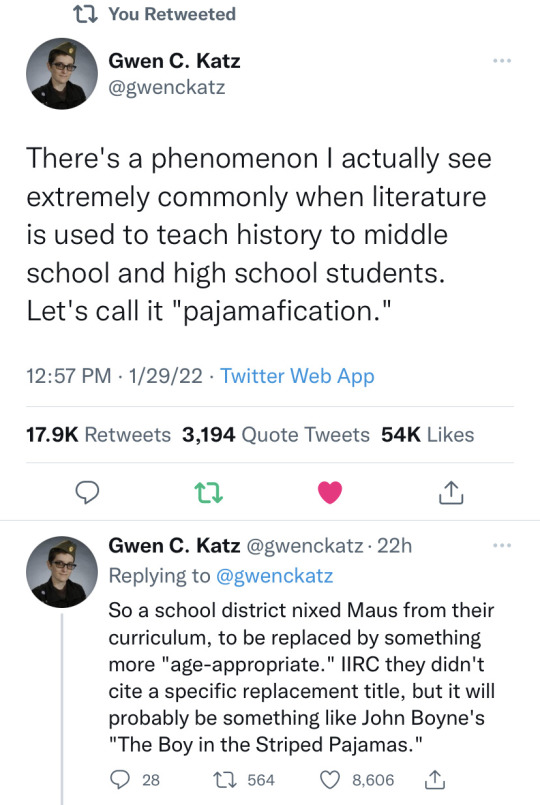
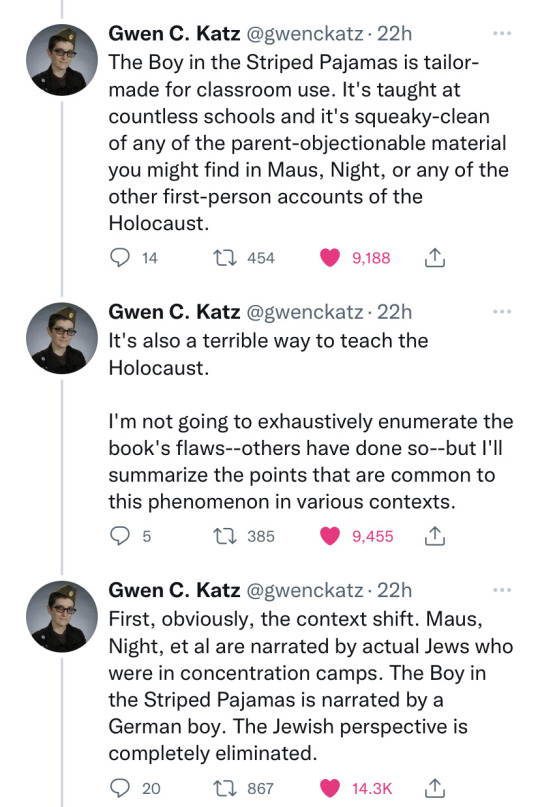
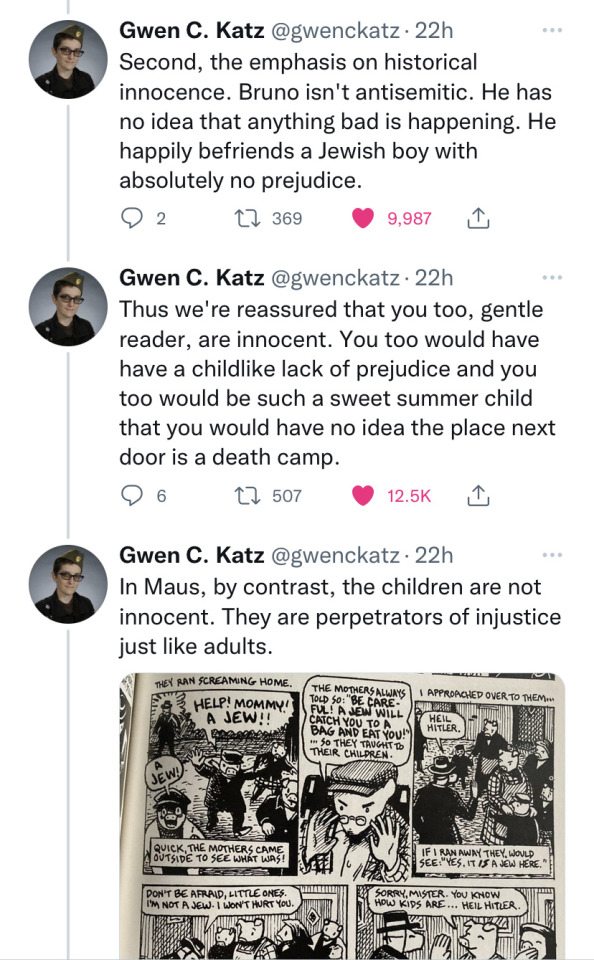
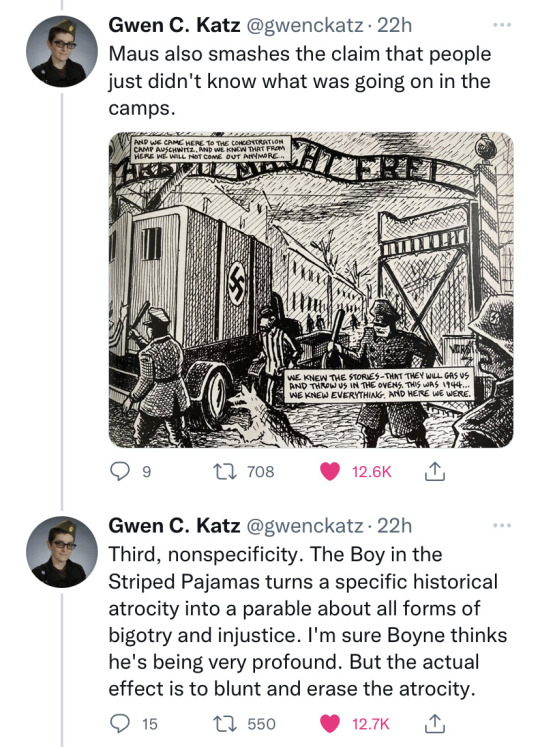
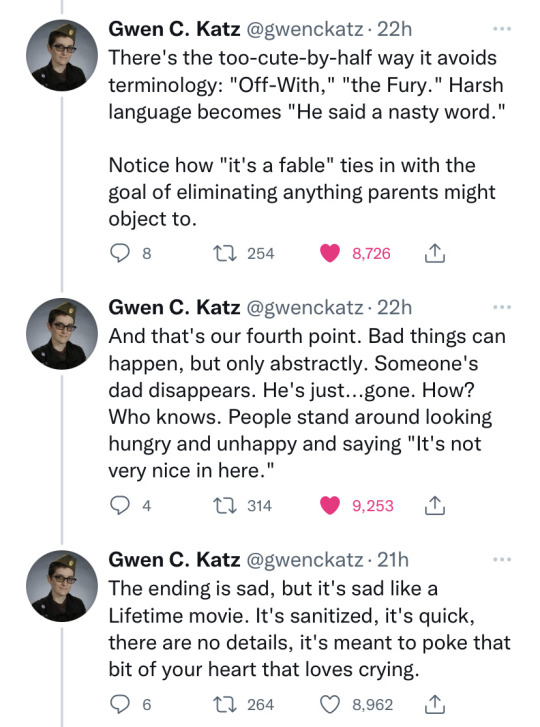
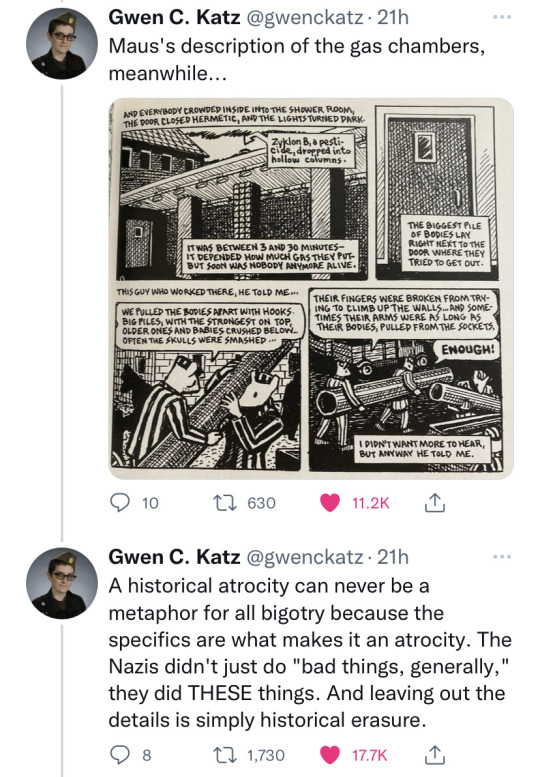
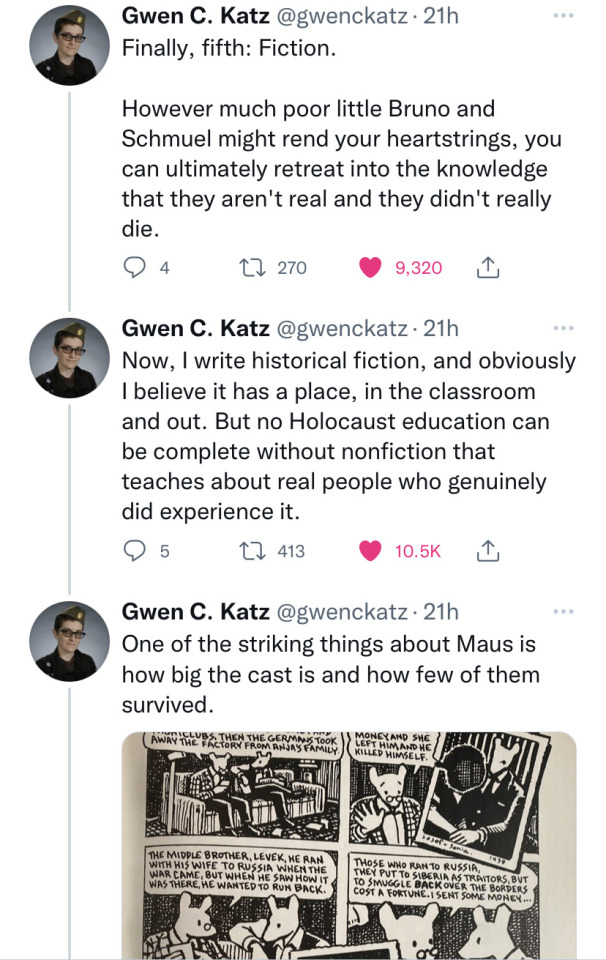
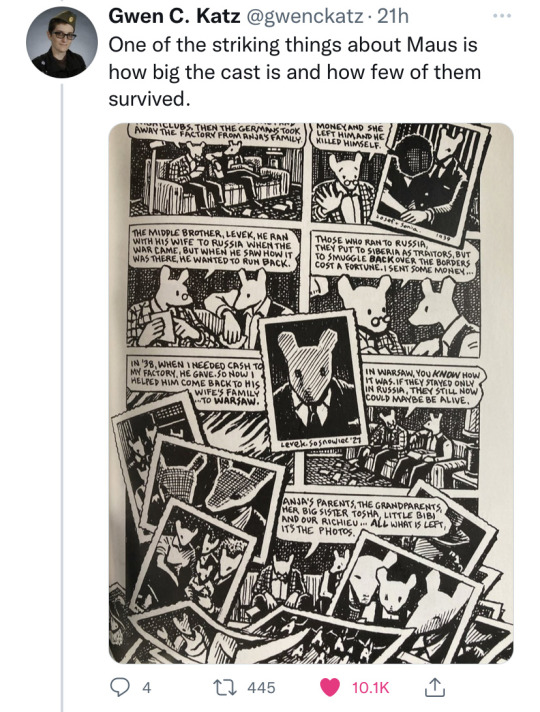
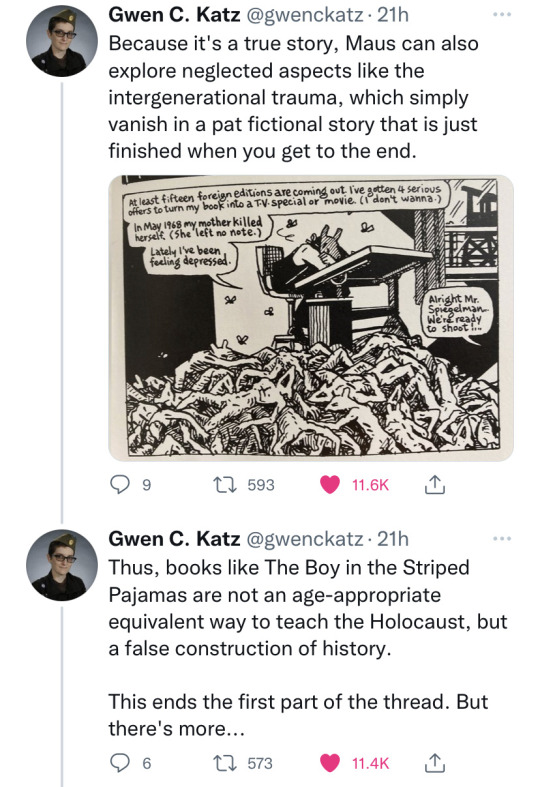
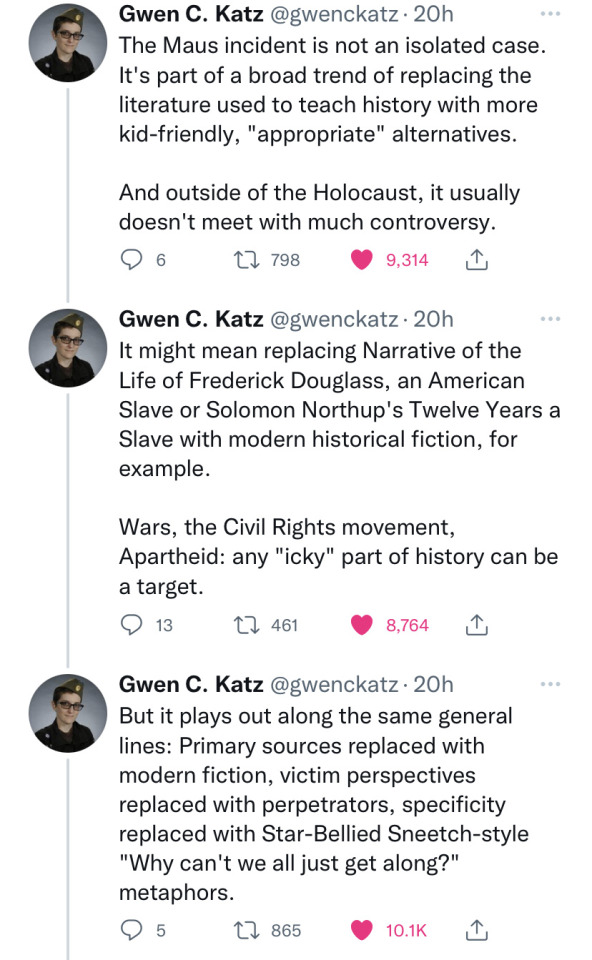
122K notes
·
View notes
Text
Week ending: 5th November
I sometimes load up a song only to realise it's already in my liked songs. Usually this is not a huge surprise to me, but I have to say, this one confused me - I have no memories of ever seeing it or its artist before, but apparently I liked it enough to save it to my liked songs? However that happened, that probably bodes well, right?
Red River Rock - Johnny and the Hurricanes (peaked at Number 3)
Okay, still no idea where I've come across this before, but I can confirm that I was 100% right to put it into my liked songs. It's a little slice of instrumental rock and roll goodness, based on a cowboy folk song called Red River Valley about - you guessed it - the Red River Valley in Manitoba, so just north of places like Dakota and Minnesota. This original song was written initially around 1870, when an expedition set out there to put down the so-called Red River Rebellion, which was apparently the first big crisis Canada faced after confederating as one entity in 1867. The local Métis population, in particular, who were mostly French-speakers, didn't appreciate the new English-speaking governor, and set up their own provisional government, prompting the Wolseley Expedition to be sent out as a way of reinforcing official Canadian power. It wasn't a complete defeat for the Métis, though - off the back of talks that were held, separate French education for Métis children and protection of Catholicism were obtained, and Manitoba was cemented as an official Canadian state.
All this, of course, is a fascinating but ultimately rather irrelevant side-tangent to a song that in practice is barely about the Red River Rebellion. Sure, it's presumed to be written from the perspective of a local Métis woman, who's fallen in love with a soldier, and is sad that he's now going to be packing up and going back east. But the result are lyrics that could be about anybody separated from their love - the universality of it, as a theme, is doubtless a large part of the reason the song has survived the test of time. And then this particular version takes it one step further away from its original historical context by turning it into a rock and roll instrumental, with a Hammond organ taking over the main melody line. So yeah, interesting history that I had absolutely no idea about, but not actually crucial to know.
I will say that adapting a folk song does immediately have one big advantage, which is that you're looking at a tune that's by definition catchy enough to have stood the test of time, and simple enough that people will remember it. There's also, I guess, a built in audience who will recognise it at least well enough to go "huh, that sounds familiar" - even if you don't know the specific tune, there are definite echoes of other folk classics like She'll Be Coming Round the Mountain. So it feels a very comfortable thing - you can feel exactly where the tune's going, in a very reassuring way. It's the same trick that Bill Haley was pulling all the way back on tracks like The Saints' Rock and Roll or Rockin' Through the Rye, and it's just as effective here as it was there.
I also think that the Hammond organ and sax combination here adds something really distinctive and memorable to the track. There's a sort of raucous, boisterous sense of swagger to it all. Add in a thumpy set of drums and a guitar bassline that's chuggy and bluesy, and you've got something that honestly sounds a little bit glam rock, to me. I mean, listen to this, and tell me that you couldn't imagine a band like Slade pulling off a pretty decent cover? It's trememdously good music for headbanging to, the sort of record I could absolutely imagine people putting on for a spin at their 1959 Christmas parties. What it lacks in subtlety, it absolutely makes up in fun.
I didn't mention this elsewhere, so I will mention it here: Johnny and the Hurricanes is also an absolutely badass band name. 10/10.
I'm really digging some of these instrumental tracks you're beginning to get, here. This one, in particular, really tickled something in my brain - I think it's the repetition of the tune, and the way you can really quickly pick it up. I also enjoy some Hammond organ. There are very few songs that aren't improved by a Hammond organ, and combined with sax, it just creates this awesome, full, warm rock and roll sound that I kind of love. Plus I learnt some history about how Canada became Canada. Which is a nice bonus to a song I already was enjoying. So yeah, good job to past me, I guess - this can sta in my liked songs.
Favourite song of the tangentially Canadian bunch: Red River Rock
0 notes
Text
i know that people joke a lot about reading comprehension being low in the modern day, but srsly THERE IS A LARGE CHUNK OF PEOPLE THAT HAVE UNDERDEVELOPED CRITICAL READING SKILLS AND THAT'S REALLY CONCERNING!!!!!!!!!!
"oh that character is morally bad because they did something Wrong one time/a bunch of times, they are a Bad Person and there is no point in interrogating their fictional actions within the setting of this peice of media"
"oh i'm going to hyperfixate on a single statement made by this user without considering the context in which that statement was framed"
"oh i disagree with this person based on the first sentence of their post, i'm not going to spend the time reading the rest of their post to understand exactly what it is i disagree with, i'm just going to send a death threat"
I am very concerned about the ramifications of this lack of critical reading skills. Not only because it causes needless internet slap fights, but because it has real world impact: there is an atmosphere on the internet currently in which you CANNOT have a nuanced opinion. You either wholeheartedly agree with the surface message of a piece of media, or you disagree entirely. If there is a book about a serial killer and you like the manner in which the author presents the serial killer as a protagonist because it provides an insight into the perspective of someone who otherwise would not be afforded any consideration or empathy, you are a Bad Bad Person because you are endorsing the murders of all victims across the world.
Which is demonstrably untrue.
This lack of reading comprehension and contextual understanding means that large swathes of literature are labelled as "problematic" and immediately discarded. Now clearly there is a variety of literature that does not align with modern values, but without evaluating that work critically, how can you understand your own views?
Let's look at a very mild example: Emma by Jane Austen. This book features an age-gap relationship between the titular character and Mr Knightly, in which Emma is 21 years old and Mr Knightley, 37 years old. I'm sure many people nowadays would be suspicious of this kind of age gap and rightly so, as it doesn't align with a western cultural understanding of what a healthy, equal relationship appears as. But to turn your nose up at this fact in a vacuum does a great disservice to the context of the work. Emma at 21 is not considering young, and Mr Knightley says himself that he fears his age is a barrier to their relationship. To collapse a 500 page novel into a few lines of analysis, the historical context of the work matters, as does Austen's authorial perspective. I would argue that Emma is proto-feminist; many people may disagree. But critical discourse about this relationship is much more productive than simply labelling Emma as a Bad Problematic Book.
In the current age of the internet, people want to be fed information and move on, but this learned informational helplessness is so destructive. There are clear root causes of this: the post-truth era, charismatic politics, defunding of the arts and humanities in schools, covid causing educational delays. It just really worries me that people cannot truly read anymore, and what that means for social interactions when we are increasingly spending our time online.
Let me be crystal clear: I do not believe that this is a case of people online bringing intentional bad faith reactions to media and social interaction. Maybe like 5% of the time people are looking for a fight, but mostly I believe that it is because these people have been failed by their environments. Although we can't singlehandedly fix the education and political systems across every single country on earth, we can engage with people in a good faith way. Yes, it takes work, and no, you do not have to do anything. I completely understand if you don't want to engage in these kinds of discussions, especially if you're providing an uninvited contribution.
If the opportunity arises, I find bringing a good faith response to a reductive take on media, and continuing to engage that person in a way which explicitly attempts to understand their perspective yields positive results. And you can always walk away.
Shock upon shock, I have even been able to have a good faith discussion in a Tiktok comments section, so there is hope.
TL;DR - poor reading comprehension = needless moralising, but if you just chat to people it's really not that bad.
1 note
·
View note
Text
'Concerned over getting flamed online, Oppenheimer Production Designer Ruth de Jong describes Christopher Nolan candidly dismissing historical accuracy if it distracted from the movie's "timelessness."
De Jong is credited with production design on Yellowstone, Jordan Peele's Us and Nope, and more, and constructed the bunkers where Oppenheimer's bomb went off. She revealed to Craft Services' podcast how Nolan would ask her to "completely divorce" herself of the details. "I would get so engrossed in the research, and he's just like, 'Look, I'm not making a documentary. This cannot be a snooze fest. I'm selling popcorn,'" De Jong quips. "I would just lean into it [the details] and go, 'B-but...' Chris' [Nolan] biggest thing was trying to fight the contrivedness of an overly period film [...] He wanted it to have a timeless feel, and almost be very modern in its own right."
De Jong gives an example of how people in 1932 would likely be driving a 1920s vehicle. "He's [Nolan] just like, 'But the cars from the 20s, the Model Ts, were so boxy,' and 'specific' and almost 'ornate', and 'distracting'?" she adds. "That he's like, 'I'd much prefer the frame from 1937.'"
"And of course," De Jong continues, "I'm going, 'Oh, my Gosh. They're going to eat us alive on Reddit, and go, 'It's not 1937!' and 'It's 1932!' I think the reality is in all of that, at the end of the day, Yes--sure, you could then go through [each detail], but I think that's not the point of the film, actually. You're recreating an essence. You're recreating a moment in time. While we wanted to be accurate and be correct, there's also just an artistry. We could do whatever we wanted essentially, you know?"
Oppenheimer Hasn't Been Witout Criticism
Criticism of Oppenheimer intensified after the film's release and the craze of Barbenheimer, certifying the biopic as a success at the expense of apparent cultural and historical insensitivity. Critics drew attention to Oppenheimer's limited focus on the victims, drawing attention to the lack of a Japanese perspective, nor the Native Americans forced from their home in Los Alamos - ground zero for testing. The online hashtag #NoBarbenheimer began in Japan due to Barbenheimer overshadowing the film's sensitive themes.
De Jong's work in creating an immersive experience contributed to one of the most successful films of all time, leading many fans to disagree with the characterization that Oppenheimer was insensitive. Nolan's approach to immersion even if it meant creative liberties culminated in what fans described as "devastating," and something out of a "horror film." Later in the podcast De Jong describes how the cohesion of Oppenheimer's settings and environments was achieved by using many buildings across different time periods, including a girls' private school.'
0 notes